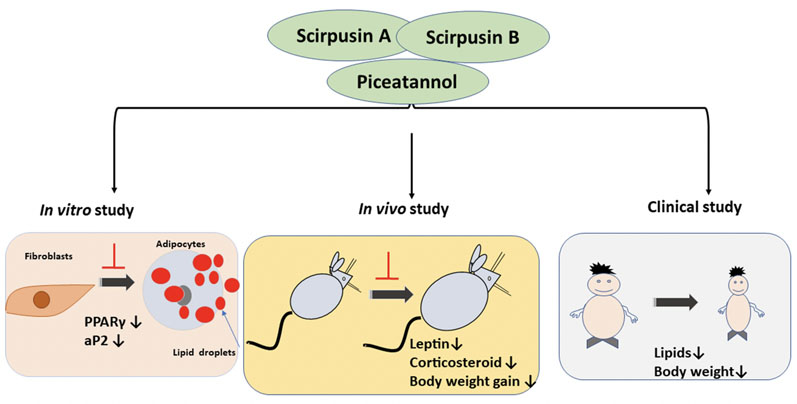Containing 6–8 % stilbenes, in the form of scirpusin A, scirpusin B and piceatannol, Cirpusins® is a standardised extract from the rhizomes of Cyperus rotundus. Scirpusin A is a dimeric hydroxy stilbene of resveratrol and piceatannol, whereas Scirpusin B is a dimer of piceatannol.
Cyperus rotundus is a perennial plant belonging to Cyperaceae family; it grows naturally in tropical and temperate regions and is traditionally used to treat stomach disorders and emotional disturbances.
Obesity is a challenging condition involving excessive body fat, which is a consequence of an imbalance between energy consumption and expenditure.
More specifically, it’s the result of a complex interaction between the environment, diet, genetics, lifestyle, endocrine disorders, medication and psychological factors.
More than just a cosmetic issue, obesity is a recognised medical problem; it increases the risk of heart disease, diabetes, high blood pressure and certain cancers.
Childhood obesity is now a growing public health concern for which early prevention is critical. The prevalence of obesity is rising particularly fast in emerging economies.
For most people, body mass index (BMI) provides a reasonable estimate of body fat. According to the World Health Organization (WHO), individuals with a BMI of 25–29 kg/m2 is considered to be overweight and more than 30 kg/m2 is obese.
Preclinical and clinical studies have shown the anti-adipogenic properties of Cirpusins. Results from a human clinical study showed that supplementation with Cirpusins effectively managed the weight and hypercholesterolemia in overweight individuals.1

The stilbenes in Cirpusins are polyphenols with multiple biological applications. Cirpusins has been evaluated for weight management and the maintenance of normal lipid profiles. In short, Cirpusins supplementation
- helps with weight management
- supports normal lipid profiles
- promotes weight loss.
Cirpusins can be used as a dietary supplement in the form of tablets, capsules, a powder premix and other food formulations for weight management.
Reference
- www.ncbi.nlm.nih.gov/pmc/articles/PMC8843772/.
